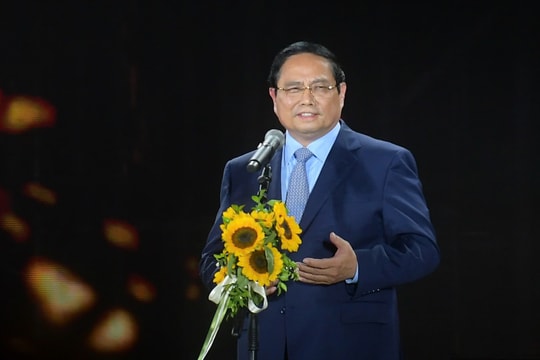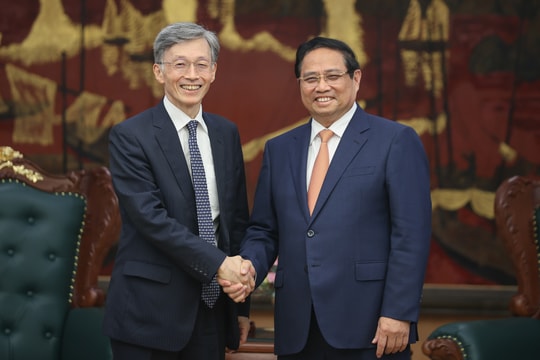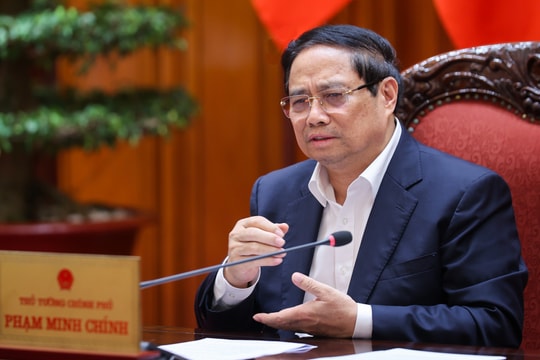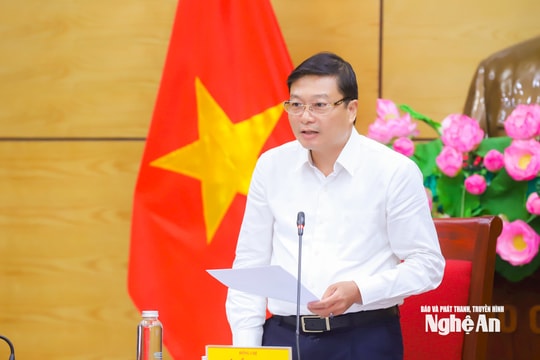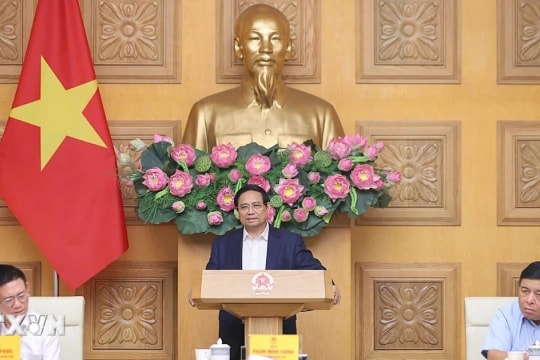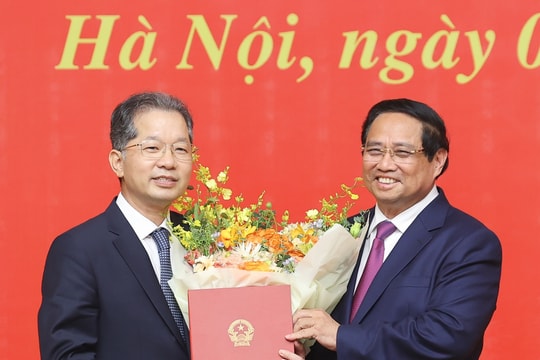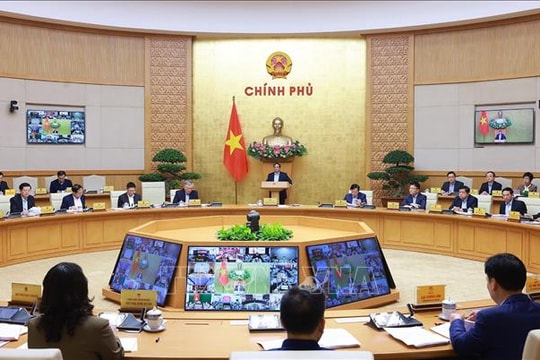Prime Minister Pham Minh Chinh answered questions and clarified a number of issues of concern to National Assembly deputies and voters.
On the afternoon of November 5, at the question and answer session of the 4th session of the 15th National Assembly, on behalf of the Government, Prime Minister Pham Minh Chinh explained a number of issues that National Assembly deputies, compatriots and voters were interested in and noted.
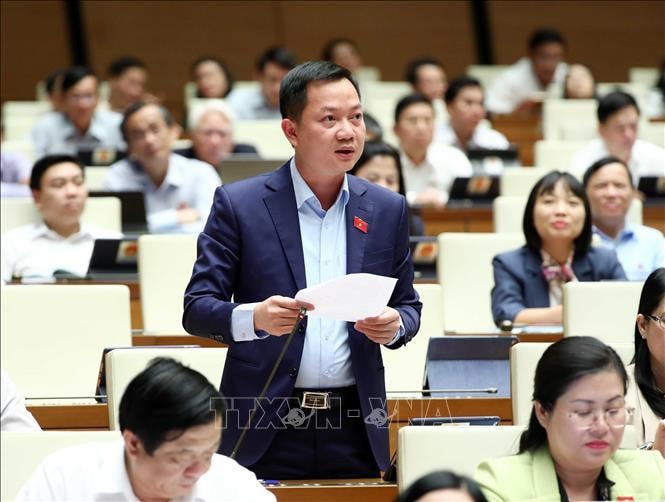 |
National Assembly delegate of Dong Nai province Trinh Xuan An asks questions. Photo: Pham Kien/VNA |
According to delegate Trinh Xuan An (Dong Nai), the COVID-19 pandemic can be considered an extremely severe test for the leadership and management of the Government, the Prime Minister and also for the entire political system in the coming time. Given the unpredictable developments of the world and regional situation, as well as the complicated developments of various epidemics, the risk of situations such as the COVID-19 pandemic as well as difficulties and pressures in macroeconomic management are always present, especially the pressure from inflation and the possibility of "epidemic on epidemic". From there, delegate Trinh Xuan An asked the Prime Minister to inform the lessons learned to anticipate and prepare for situations that may occur in the future, ensuring effective handling and avoiding unexpected passiveness.
Responding to this issue, Prime Minister Pham Minh Chinh stated that after more than two years of unprecedented and unpredictable fighting against the pandemic and the great effort required to control the epidemic, there has not been time to summarize. However, the National Steering Committee for COVID-19 Prevention and Control agreed that it will have to conduct a summary to draw lessons.
The Prime Minister said that experience in the process of fighting the epidemic has shown that three main pillars have been put forward: testing - isolation - treatment; at the same time, a formula for fighting the epidemic has been proposed: 5K + vaccine + medicine + treatment + technology + people's awareness and many other factors.
The Prime Minister said that in fact, we have followed the above spirit in two phases. In phase 1, when we had not yet had access to the vaccine and did not fully understand the virus, we were forced to use administrative measures. Then, when we realized that administrative measures were very difficult to succeed, we promoted the vaccine strategy, combined with public awareness, which are two very important factors; thereby pushing back the epidemic.
The Prime Minister shared that with the anti-epidemic viewpoint of "putting people's health and lives first and foremost" and "fighting the epidemic early, from afar, from the grassroots", with the leadership of the Party, the participation of the entire political system, the support of the people and businesses, the help and sharing of international friends, our country has succeeded in controlling the epidemic.
The Prime Minister also emphasized that the spirit of national solidarity is very important. Based on the appeal of General Secretary Nguyen Phu Trong, the spirit of national solidarity has helped us turn danger into opportunity. This is a national issue, so we must take the people as the center and subject in preventing and fighting the epidemic. We also combine national strength with external strength, the strength of the times, because this is a global issue, so we need to call for international solidarity and promote multilateralism.
Along with that, the Prime Minister emphasized that it is necessary to perfect the institutions to prevent and control the epidemic. The National Assembly was very wise in issuing Resolution 30 to handle institutional issues and on this basis, the Government and agencies have continued to concretize to resolve difficulties and problems in institutions and regulations. Along with that, it is necessary to continue to strengthen grassroots health care and preventive medicine; invest in people; facilities; and promote international cooperation in disease prevention and control.
Support peace, stability, cooperation and development
Delegate Nguyen Anh Tri (Hanoi) raised the issue that in recent times, the country's foreign affairs activities have been very successful thanks to its steadfastness, flexibility and suppleness. From there, the delegate asked the Prime Minister to inform about some foreign affairs orientations in the coming time in the context of many complicated and unpredictable developments.
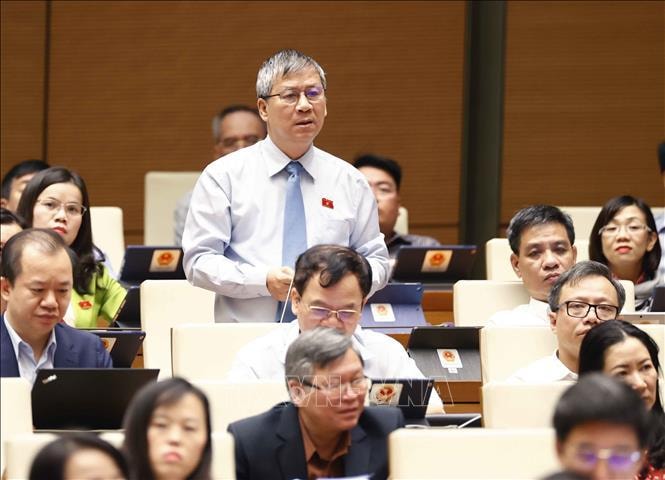 |
Responding to this issue, Prime Minister Pham Minh Chinh said that regarding foreign policy orientation, the Platform for national construction in the transitional period to socialism, the Constitution and the Resolution of the 13th Party Congress clearly stated the foreign policy of independence, self-reliance, diversification and multilateralization of foreign relations; proactively and actively integrating comprehensively and deeply into the international community; being a friend, a reliable partner and an active, responsible member in the international community; for peace, stability, cooperation and development.
Our country is institutionalizing and concretizing this foreign policy in the current regional and international context, with three main pillars: political diplomacy, economic diplomacy and cultural diplomacy.
"We do not choose sides but choose justice and reason, supporting issues for peace, stability, cooperation and development, in line with our foreign policy stance," the Prime Minister emphasized.
Maximize Vietnamese identity and culture
Delegate Nguyen Thi Thu Dung (Thai Binh province) asked about the results of implementing tasks and solutions in developing culture, building Vietnamese people, meeting the requirements in the new situation. From there, the delegate asked the Prime Minister to inform about the results of implementing tasks and solutions to promote decentralization and delegation of power in state management, difficulties, obstacles and solutions.
Regarding the issue of culture, the Prime Minister said that recently, we have organized a national cultural conference with the conclusions and directions of the General Secretary and are continuing to concretize the Party's policies and guidelines, putting culture on par with politics, economics and society. The results of the implementation in the recent period, awareness of cultural issues is being raised, bringing about changes in actions and will continue to bring about better results in the coming time.
"There needs to be investment in resources, institutions, and human resources to maximize Vietnamese identity and culture, build Vietnamese people, and maximize the capacity, intelligence, and qualities of Vietnamese people for the process of building and defending the Fatherland..." - the Prime Minister emphasized.
Regarding the issue of decentralization and delegation of power, the Prime Minister said that this is a big issue that the Party and the State are very concerned about. Decentralization and delegation of power must go hand in hand with appropriate resource allocation and improving the capacity of enforcement officers, so it is necessary to review, amend and supplement legal documents. Currently, the Government really wants to decentralize and delegate power but there are still some regulations. This is a bottleneck that needs to be resolved. In the future, the Government will review to do better on this issue.
Institutional reform is a strategic breakthrough.
Raising questions in the hall, National Assembly delegate Ma Thi Thuy (Tuyen Quang) said that from the very first days of taking office, the Government and the Prime Minister identified institutional reform as one of the key tasks. From there, the delegate raised questions about the main viewpoints and pillars in institutional reform.
Responding to the question of delegate Ma Thi Thuy, Prime Minister Pham Minh Chinh affirmed that institutional reform is one of the three strategic breakthroughs. Institutional reform must closely follow reality, stem from reality and respect objective reality, serve the interests of the people, and take the people as the center and subject. The pillars that need to be focused on are building a socialist rule-of-law state, building a socialist-oriented market economy and building socialist democracy with a consistent viewpoint, taking people as the center and subject, the goal, the driving force and the resource for development.
Prime Minister Pham Minh Chinh said that every month the Government holds a thematic meeting to discuss institutions and law-making. Since the beginning of the term, the Government has reviewed nearly 70 laws and is submitting more than 10 draft laws to the National Assembly.

